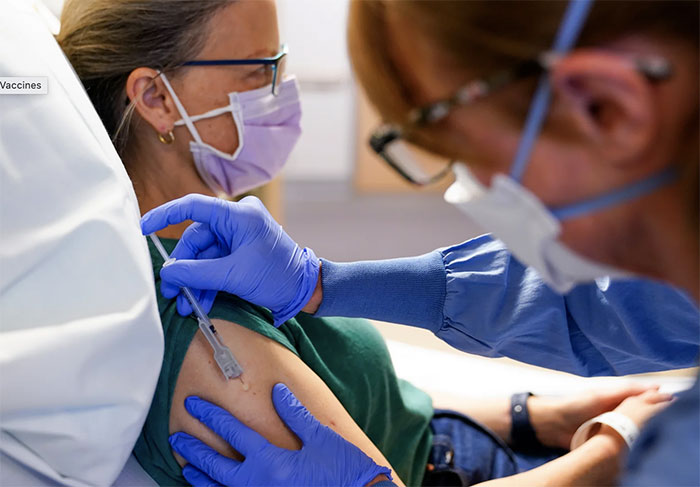After decades of limited success, scientists report that their research is reaching a turning point, with many predicting the arrival of cancer vaccines within the next five years.
These are not traditional vaccines that prevent infections; instead, they are injections aimed at shrinking tumors and preventing cancer from returning. The targets of these experimental treatments include breast cancer and lung cancer, with achievements reported this year in melanoma and pancreatic cancer.

Vaccines may be the next major advance in cancer treatment.
“We are making it work. Now we need to make it work better,” said Dr. James Gulley, head of a center at the U.S. National Cancer Institute, where immune therapies, including cancer treatment vaccines, are being developed.
T-Cell Training Vaccines for Cancer
More than ever, scientists understand how cancer hides from the body’s immune system. Cancer vaccines, like other immune therapies, enhance the immune system’s ability to find and destroy cancer cells. Some new types utilize mRNA technology, originally developed for cancer but first applied in the Covid-19 vaccines.
Dr. Nora Disis at the UW Medicine Vaccine Institute in Seattle, USA, stated that for the vaccine to be effective, it needs to teach T-cells in the immune system to recognize cancer as a threat. Once trained, T-cells can move throughout the body to hunt down the danger.
Ms. Disis remarked: “If you see an activated T-cell, it’s almost like it has legs. You can see it crawling through blood vessels to get into tissues.”
Patient volunteers are crucial for the research. Kathleen Jade, 50, learned she had breast cancer in late February, just weeks before she and her husband were set to embark on a world adventure. Instead of piloting their 12-meter boat, Shadowfax, across the Great Lakes toward the St. Lawrence maritime route, she was sitting in a hospital bed waiting for her third dose of an experimental cancer vaccine. She is receiving the vaccine to see if it can shrink the tumor before surgery.
“Even if the chance is small, I feel it’s worth it,” said Ms. Jade.

Nurse administering the third dose of the experimental breast cancer vaccine to patient Kathleen Jade at the University of Washington Medical Center – Montlake, Seattle on May 30, 2023. (Photo: AP)
Promising Advances in Effective Cancer Treatment Vaccines
Advancements in cancer treatment vaccines are facing numerous challenges. The first, Provenge, was approved in the U.S. in 2010 for metastatic prostate cancer. It requires processing the patient’s own immune cells in a laboratory and reinfusing them via intravenous injection. There are also vaccines for early-stage bladder cancer and advanced melanoma.
“All the failed trials have taught us a great deal,” researcher Nora Disis noted.
As a result, she is now focusing on patients with earlier-stage diseases since experimental vaccines do not benefit those with severe conditions. Her team is planning to research a vaccine in women with non-invasive breast cancer, known as ductal carcinoma in situ, who are at low risk.
Several cancer-preventing vaccines are also promising on the horizon. The hepatitis B vaccine has been studied for decades to prevent liver cancer, while the HPV vaccine, introduced in 2006, aims to prevent cervical cancer.
In Philadelphia, Dr. Susan Domchek, director of the Basser Center at Penn Medicine, is recruiting 28 healthy individuals with BRCA mutations (tumor-suppressing genes) for vaccine trials. These mutations increase the risk of breast and ovarian cancers. The idea is to eliminate abnormal cells early before they cause issues. Dr. Domchek compares it to regularly weeding a garden or erasing a whiteboard.
Other research groups are developing vaccines to prevent cancer in individuals with precancerous lung nodules and other genetic conditions that elevate cancer risk.
Dr. Steve Lipkin, a medical geneticist at Weill Cornell Medicine in New York, who is leading an initiative funded by the U.S. National Cancer Institute, said: “Vaccines are likely the next critical milestone in the mission to reduce cancer mortality. We are dedicating our lives to that.”
Pharmaceutical manufacturers Moderna and Merck are also collaborating to develop a personalized mRNA vaccine for patients with melanoma, with a large study set to begin this year. The vaccine is customized for each patient, based on various mutations in their tumor tissue. Such a personalized vaccine could train the immune system to seek out the mutation traces of cancer and destroy those cells.
However, such vaccines will be very expensive.
“Essentially, you have to create every type of cancer vaccine from scratch,” Dr. Patrick Ott at the Dana-Farber Cancer Institute in Boston stated. If the vaccine is not personalized, it could be produced at a very low cost, similar to Covid vaccines.

Personalized mRNA cancer treatment vaccines will be expensive. (Photo: Getty Images).
The vaccines being developed at UW Medicine are designed to work for multiple patients rather than just one. Trials are underway for early-stage and advanced breast cancer, lung cancer, and ovarian cancer. Some results may be available next year.
Todd Pieper, 56, residing in suburban Seattle, is participating in a trial for a vaccine aimed at shrinking lung tumors. His cancer has metastasized to the brain, but he hopes to live long enough to see his daughter graduate from nursing school next year.
Pieper spoke about his decision to volunteer: “I have nothing to lose and everything to gain, for myself or for others in the future.”
One of the first recipients of the ovarian cancer vaccine in a trial 11 years ago was Jamie Crase on Mercer Island, near Seattle. Diagnosed with late-stage ovarian cancer at just 34 years old, Crase thought she would die young and made a will leaving her favorite necklace to her best friend. Now 50, she shows no signs of cancer and still wears the necklace.




















































